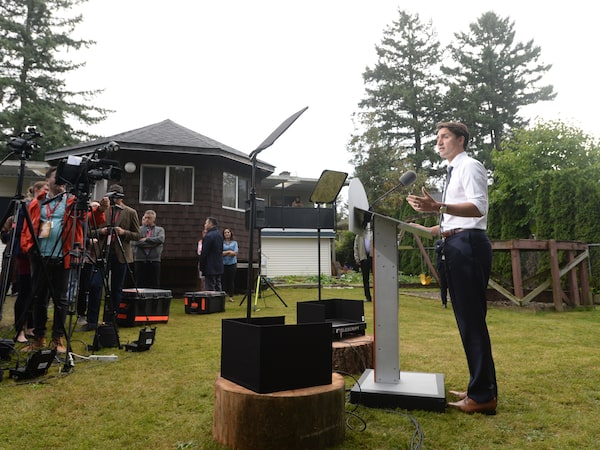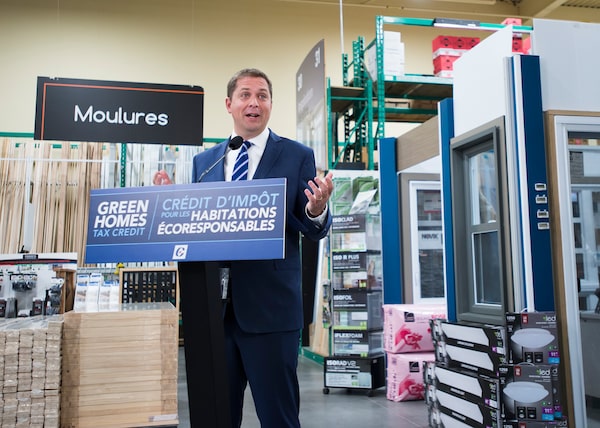
Liberal Leader Justin Trudeau, seen here in Delta, B.C. on Wednesday, said if re-elected on Oct. 21, a Liberal government would help Canadians lower their energy bills by making their homes more energy efficient.Ryan Remiorz/The Canadian Press
The Liberals and Conservatives each made pitches to homeowners on Wednesday, with both parties proposing measures that aim to reduce the cost of making a home more energy efficient.
Liberal Leader Justin Trudeau announced in Delta, B.C., that, if re-elected on Oct. 21, a Liberal government would help Canadians lower their energy bills by making their homes more energy efficient. He also promised to help people prepare their homes for climate-related disasters.
Meanwhile in Quebec, Conservative Leader Andrew Scheer reiterated his party’s proposal to create a two-year income-tax credit of 20 per cent for green improvements to homes. The Conservatives estimate the refundable tax credit would allow savings up to $3,800 on renovations of up to $20,000.

Conservative leader Andrew Scheer, seen here, reiterated his party’s proposal to create a two-year income-tax credit of 20 per cent for green improvements to homes.Nathan Denette/The Canadian Press
The Liberal plan introduced on Wednesday proposes to retrofit 1.5 million homes over five years to make them more energy efficient. A document from the Liberal Party says the program would fall under Canada Mortgage and Housing Corp. (CMHC). It would give homeowners and landlords a free energy audit and also an interest-free loan of up to $40,000, based on the results of the audit. It says the loan could be paid back over 10 years through a CMHC-insured mortgage, bank loan, or in partnership with a utility company, by using the cost savings from lower monthly energy bills.
The document says that those who proceed with the loan would receive a cash incentive of $250 to $750, with the higher amount going to those who cut the most energy waste.
The Liberals are also proposing a grant that would offer up to $5,000 to those buying newly built homes that are certified to produce net-zero emissions. The Liberals also propose investing $100-million in skills training to ensure there are enough qualified workers to respond to the demand for energy audits, retrofits and net-zero emissions home construction.
Federal election 2019: Where the four main parties stand on climate policy
They are also promising to provide additional assistance when homes are affected by the climate. Mr. Trudeau said a Liberal government would work with provinces and territories to complete all flood mapping in Canada. The Liberals say that work would inform the creation of a new “low-cost national flood insurance program.” The party has not explained how much that would cost or how it would work.
When asked by a reporter, Mr. Trudeau did not say whether there should be a cap or a limit on how much taxpayer money homeowners get before they are forced to move or no longer be insured.
He also said the Liberals would extend employment-insurance coverage to people who are forced to stop working in order to respond to a natural disaster. Mr. Trudeau didn’t say how much the new plan would raise EI premiums, saying the party still has to “work on program design.”
“This is something that is needed,” he said, pointing to recent wildfires in Fort McMurray, Alta., and the B.C. Interior and floods in Gatineau, Que.
Mr. Scheer, who released his environmental plan in June, said his proposed tax credit would encourage Canadians to renovate their homes in order to lower bills, as well as reduce greenhouse gas emissions.
Dianne Saxe, the former environmental commissioner of Ontario who now runs green consultancy Saxe Facts, said both parties are right: Most people live in old homes that leak heat outdoors. Ms. Saxe said it wastes money and creates pollution.
Ms. Saxe praised the Liberal plan for making audits available, providing a financing plan, ensuring appliances will be efficient and making sure people are properly trained with skills to respond to the changes.
“So on those four big points, the Liberal plan is enormously superior,” she said.
In terms of the Conservative plan, having a refundable tax credit is “better than a kick in the pants," she said, adding she doesn’t think it would make a difference because the amount is too small to deal with large renovations.
NDP Leader Jagmeet Singh was in Vancouver, unveiling his party’s plan to tackle money laundering in the real estate industry. The NDP proposed creating an RCMP anti-money laundering unit with a $20-million annual budget.
The latest numbers from Nanos Research show the race for first place remains close. The Liberals and the Conservatives both have the support of 35 per cent of respondents. The NDP is at 13 per cent, followed by the Green Party at 9 per cent, the Bloc Québécois at 6 per cent and the People’s Party of Canada at 2 per cent.
The poll was sponsored by The Globe and Mail and CTV, with a total of 1,200 Canadians surveyed from Sept. 22 to 24. It has a margin of error of 2.8 percentage points, 19 times out of 20. Respondents were asked: “If a federal election were held today, could you please rank your top two current local voting preferences?” A report on the results, questions and methodology for this and all surveys can be found at tgam.ca/election-polls.
 Marieke Walsh
Marieke Walsh Kristy Kirkup
Kristy Kirkup Janice Dickson
Janice Dickson